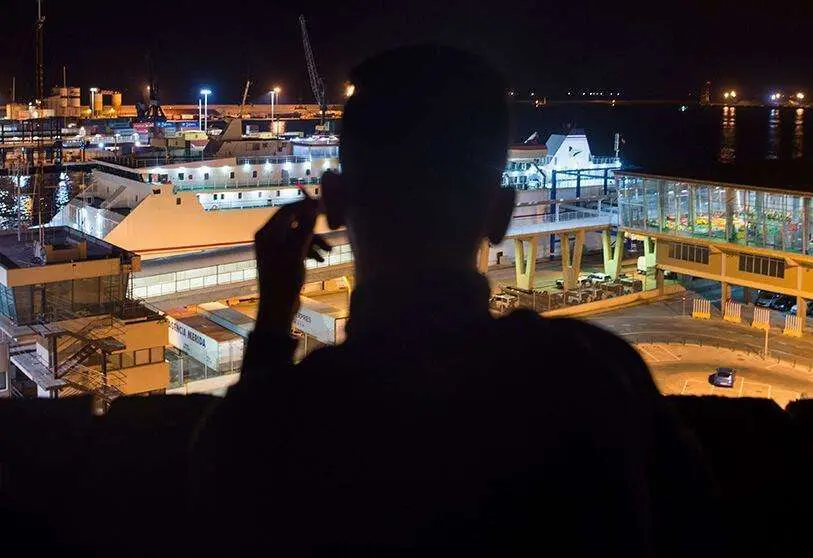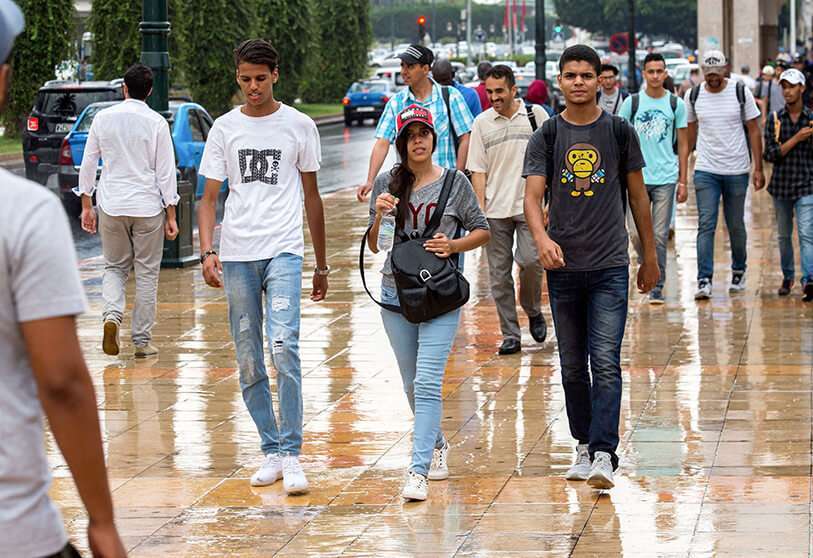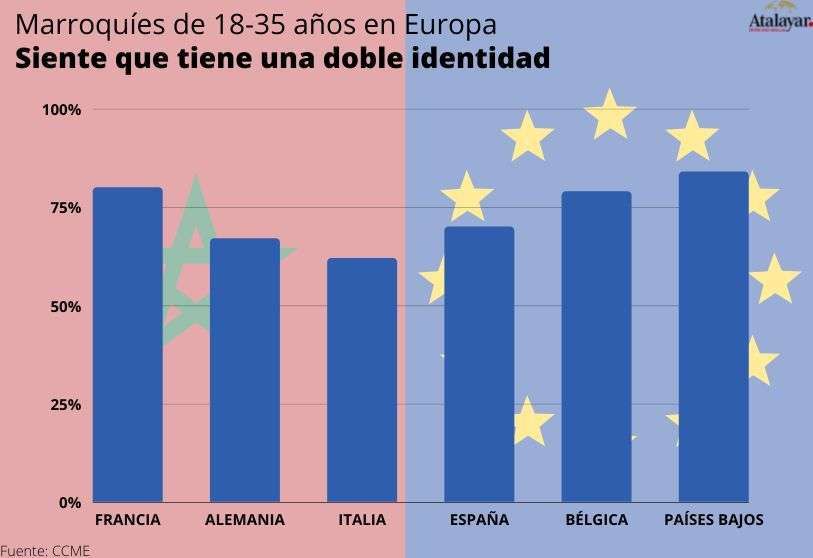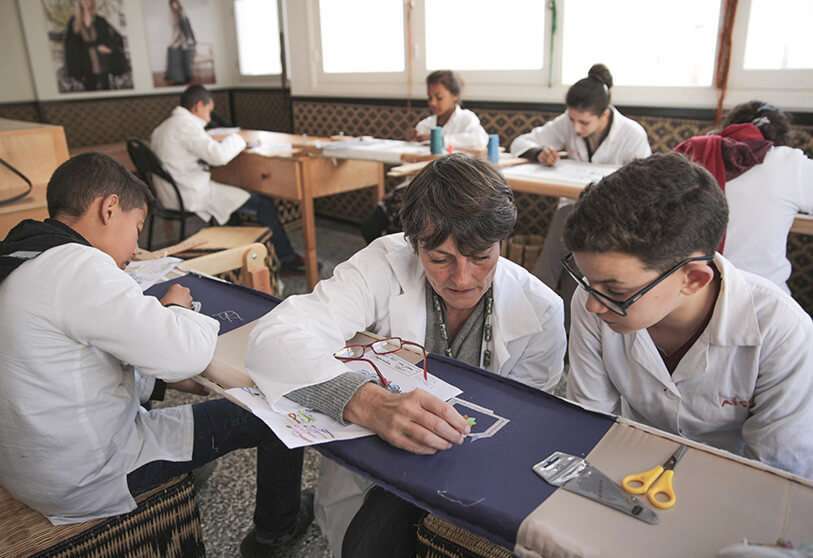Una juventud entre Marruecos y España

Young Moroccans talk to us about how they carry their sense of dual identity and their relationship with Morocco
Carrying a piece of Morocco with them is one of the major defining features of the Moroccan diaspora living in the European Union. A diaspora that, as well as within Morocco, has youth as its protagonist, not only in the present but also in its future.
The recent survey commissioned by the Council of the Moroccan Community Abroad (CCME) from the polling institute IPSOS, published in mid-September, once again focused the media spotlight on 18-35 year-olds. A group known in Morocco as the 'invisible electoral force'. Generally uninterested in Moroccan democratic processes, imprisoned in a sense of dual identity, which some cope with better than others, but also optimistic and hopeful of a future in Europe with opportunities they believe are out of reach in Morocco.

If Morocco's own youth is a challenge for Aziz Akhannouch's current government, as is often raised in the Maghreb country, it is rarely seen in the same light in Spain. "Once you finish your studies in Spain as a non-EU foreigner, it's as if for the institutions the road is over", sums up Sohaib N., a young Tangier-born 28-year-old resident in Madrid who came here 10 years ago to study journalism in Madrid. "Coming here for fun or for a while is easy. But to work is not so easy. Nothing is made easier by the administration", adds the young man, who is trying to maintain his situation in Spain in a regular way, without having the slightest intention for the moment of applying for Spanish nationality.
"I've never considered asking for nationality, it's not that important to me. Having residency is enough for me", explains Sohaib, for whom his identity is not defined by a document or a piece of paper. As he says, his upbringing has made him someone with an ambiguous identity. A childhood in Tangiers, fully immersed in Spanish culture through television, internet, school, did not make him feel like a foreigner when he arrived in Spain. And when he returns to Morocco, he feels as Moroccan as the rest. "I feel in the middle of the two identities", says the young journalist, a feeling he shares with 70% of those surveyed in Spain by the CCME study. A feeling that rises to 80% in France and 84% in the Netherlands.

This is also the case of Meriem F., from Agadir, who moved to Spain 8 years ago for love and who says she feels more and more like a foreigner in Morocco. It is no longer just a question of how she feels she is perceived by others, but almost a question of comfort in her own country. "Sometimes it even pisses me off", explains Meriem, for whom the administration's services are a clear example of what bothers her most in Morocco. She is one of the 71% of the community that feels like a foreigner back in Morocco after a long period in Spain. Meriem wants to apply for Spanish nationality in two years' time. With the nationality, she wants to be able to participate in the Spanish electoral processes, in which she shows great interest, according to 51% of those surveyed by the CCME. "Moroccans in Spain are a collective. We pay our taxes, we pay contributions. Of course I would like to be able to vote", says Meriem, who also feels more than integrated in Logroño, where she lives. "There are many cases of discrimination that do nothing to help Moroccans integrate. I understand that there are people who can't, but in my case I have overcome them. I no longer feel like a foreigner here", adds the young businesswoman, who is working to make a small brand of handmade and natural cosmetic products prosper in collaboration with her mother from Agadir.
Hanan El. and Riyan H are the two youngest interviewees and both have Spanish nationality. Both are studying and, in the case of Hanan, also working. For Hanan, who had to ask for it, the essential thing is the freedom it gives. "It's not just for travelling, it's for everything," explains the young woman, who specialises in fashion design. "To work and to study everything is much easier if it is with the nationality". Hanan defines that rather than having a "double identity", she feels that she is neither on one side nor the other. "Most of the Moroccans I know were born here in Spain, but they don't feel Spanish. But neither do they feel Moroccan".

Something that these four young people of Moroccan origin agree on is one of the most striking features of the CCME's report on the interest shown by the diaspora in Moroccan electoral processes. If they all claim to be regularly informed about what is happening in Morocco, they also assume that they have no interest in wanting to vote in Morocco or in learning more about its politics. According to the CCME study, only 9% of those surveyed in Spain indicated a desire to participate in Moroccan elections, the second highest figure of the six countries surveyed.
The gap between politics and young people crosses borders. In Morocco, the low turnout of 18-29 year olds in the elections is one of the headlines that make the front pages every time. Around 30% of the Moroccan population is in the 18-29 age group and a further 27 % is under 14 years of age. The 18-24 turnout in the September 2021 elections was only a meagre 3%. It rose to 19% for 25-34, according to figures available in the Moroccan press.

If neither residents in Morocco nor residents in Spain are interested in these processes, it is mainly due to the lack of accessibility to them. "I have never voted in my life," Sohaib confesses. "I think that I and the other young people don't feel involved", adds the Tangier journalist. In his opinion, the political parties make no effort to present their electoral programmes. "I don't think it doesn't do much good. That's my conviction. I have always seen it as an archaic system," Sohaib concludes.
Riyan, 20, a student of an intermediate degree in administration, has a very similar feeling to Sohaib. "It's not something I find accessible. That's why I'm not interested in elections in Morocco or politics in general. I would still like to see a lot of changes, especially for young people," says the young student.

In addition to the low interest in politics and elections, this age group also gave the government a clear failing grade. In measuring the degree of satisfaction with the reforms undertaken by the Moroccan government, Akhannouch's government received only 18% approval in Spain, the lowest next to Germany (12%) and a far cry from Belgium's 57%.
"Young people expect nothing from the government. They just want to be able to work once they finish their studies," says Meriem. She agrees with Sohaib, who at least somewhat optimistically believes that young people want the country to prosper as much as possible. This is also the view of Riyan, who at least has a positive idea of Morocco because of what it means to him and his family. "The culture, our roots. Of course we like Morocco," says Riyan, who believes that young people only have a problem with the institutions and the economic situation, which offers fewer opportunities compared to Europe.
As for the future, the youngest of these interviewees is very optimistic, and even the hopefulness is evident in his voice. "I am sure that soon something similar to what is happening in France or Belgium will happen in Spain," says Riyan. "I really believe that in the next few years we will see ministers or senior officials in Spain bearing a Moroccan name".








